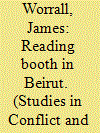| Srl | Item |
| 1 |
ID:
120437


|
|
|
|
|
| Publication |
2013.
|
| Summary/Abstract |
This article explores the relationship between suicide bombings and public cleric statements in Pakistan between 2000-2010. It establishes that bombings and statements increase over time, that cleric statements vary according to the bombing target, and that police and military targets most frequently garner clerics' attention. An adaptation of Kaplan, Mintz, and Mishal's (2006) maximum likelihood estimation method determines whether cleric statements affect the bombing rate. The analysis shows that pro-suicide statements have a far greater effect on the bombing rate than anti-suicide statements, both in the magnitude of increased bombings and by the length of time over which they exert influence.
|
|
|
|
|
|
|
|
|
|
|
|
|
|
|
|
| 2 |
ID:
120436


|
|
|
|
|
| Publication |
2013.
|
| Summary/Abstract |
Few studies have explored the factors that distinguish violent from nonviolent far-right hate groups. We examine four categories of factors on hate groups: (1) Organizational capacity, (2) Organizational constituency, (3) Strategic connectivity, and (4) Structural arrangements. Age and size, groups in conflict, groups led by charismatic leaders, groups that advocated for leaderless resistance tactics, and region increased a group's propensity to commit violence. Groups that published ideological literature were significantly less likely to be violent. By identifying factors that distinguish violent from nonviolent groups, this study helps us better understand characteristics of violent far-right hate groups in the United States.
|
|
|
|
|
|
|
|
|
|
|
|
|
|
|
|
| 3 |
ID:
120438


|
|
|
|
|
| Publication |
2013.
|
| Summary/Abstract |
The concept of Emancipation has become increasingly important in security studies in recent years but how well does the idea travel outside of the Western context in which it was conceived and into the Middle East? This article examines Hizbollah's four main identities: religious, resistance, socioeconomic, and as allies/proxies of Iran and asks to what extent this key regional non-state actor sees itself as an emancipatory agent in its own terms and how this differs from the Emancipatory ideal of Critical Security Studies (CSS). Does Hizbollah's current makeup offer enough scope to pursue Emancipation in line with the CSS project? Since the precept of Jihad offers Muslims a theological justification to engage in a holy struggle for a moral, spiritual, or political goal, seemingly Hizbollah is uniquely positioned to offer the prospect of Emancipation for the traditionally downtrodden Shi'a citizens of Lebanon, but does their Islamic faith and their aim of adherence to the Islamic way of life which they interpret from the Qur'an and Sunnah proscribe their credentials as truly Emancipatory actors? The article uses this analysis to examine the extent to which the commitment to universal Emancipation, found in CSS, is reconcilable with its Western-orientated foundation when applied in a Middle Eastern context.
|
|
|
|
|
|
|
|
|
|
|
|
|
|
|
|